|
Plenary Speakers Biographies
OPENING PLENARY
SESSION:
Tuesday, July 30, 9:00-10:00am
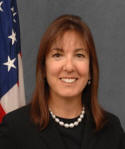 Rachel
Jacobson, Acting Assistant Secretary for Fish and Wildlife and
Parks, U.S. Department of the Interior Rachel
Jacobson, Acting Assistant Secretary for Fish and Wildlife and
Parks, U.S. Department of the Interior
Rachel Jacobson is the lead official in the office
of Assistant Secretary for Fish and Wildlife and Parks, where she
oversees policy, planning, and regulatory actions for the National Park
Service and U.S. Fish and Wildlife Service. In this capacity, Ms.
Jacobson is also responsible for historic and cultural preservation and
management of protected species. Prior to joining the Assistant
Secretary's office, Ms. Jacobson served as Interior's Principal Deputy
Solicitor where she was in a leadership role working with the Solicitor
to oversee all legal matters within the authority of the Department of
the Interior and manage an office of over 400 professionals. Notably,
Ms. Jacobson was interior's lead negotiator for the $1 billion "early
restoration" settlement with British Petroleum arising out of the
Deepwater Horizon Oil Spill in the Gulf of Mexico. Before joining
Interior in 2009, Ms. Jacobson served as Director of the Impact-Directed
Environmental Accounts Program at the National Fish and Wildlife
Foundation, where she managed a mitigation fund for environmental
restoration and habitat conservation. The majority of Ms. Jacobson's
career was spent with the U.S. Department of Justice, Environment and
Natural Resources Division.
PLENARY SESSION:
Wednesday, July 31, 9:00-10:00am
Drought, Flooding and Coastal Storms: Creating
Landscapes and Communities Resilient to Weather Extremes
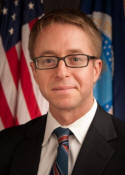 Jason
Weller, Acting Chief, USDA, NRCS Jason
Weller, Acting Chief, USDA, NRCS
Jason Weller has served as Acting
Chief of NRCS since December 2012. As Acting Chief, he oversees
programs that help protect the environment, preserve our natural
resources and improve agricultural sustainability through voluntary,
private-lands conservation. He leads a staff of 11,500 employees across
the country and manages a budget of about $4 billion.
Before assuming this role, Jason
served as NRCS’s Acting Associate Chief for Conservation and as Chief of
Staff where he worked alongside Chief Dave White and the agency’s
national and state leaders to plan and implement strategic conservation
initiatives and conduct the annual business operations of the agency.
Prior to joining NRCS, Jason
served as a staff member for the U.S. House Appropriations Subcommittee
on Agriculture where he provided oversight and crafted bills to fund
USDA programs and activities. He also served on the U.S. House Budget
Committee where he helped construct the annual congressional budget for
agriculture, environment and energy programs. Before that, Jason worked
with the White House Office of Management and Budget where he assisted
with the development and implementation of the budget for USDA
conservation programs.
Before coming to Washington, DC,
Jason worked for several years with the California State Legislature
where he provided fiscal and policy recommendations on a variety of
natural resource conservation and environmental protection issues.
Jason is a native of northern
California. He earned his undergraduate degree from Carleton College in
Northfield, Minnesota, and a graduate degree in public policy from the
University of Michigan.
Jason and his wife have two young
daughters and live in Maryland.
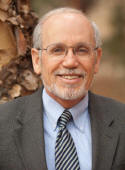 Robert
Bendick, Director, U.S. Government Relations, The Nature
Conservancy Robert
Bendick, Director, U.S. Government Relations, The Nature
Conservancy
 Since
2008, Bob Bendick has been the Director of U.S. Government Relations at
The Nature Conservancy. In this position he supervises the Conservancy’s
relationships with Congress and the Obama Administration over a wide
range of policy activities. In September, 2013, Bob will become
Director, Gulf of Mexico Program. Since
2008, Bob Bendick has been the Director of U.S. Government Relations at
The Nature Conservancy. In this position he supervises the Conservancy’s
relationships with Congress and the Obama Administration over a wide
range of policy activities. In September, 2013, Bob will become
Director, Gulf of Mexico Program.
Before coming to
Washington, D.C., Bob was Vice-President and Managing Director of the
ten-state Southern U.S. Region of the Conservancy.
He has been with The
Nature Conservancy since 1995, first as Florida Chapter Director and,
then, also in the dual role as Florida Director and as director of
previous southeastern U.S. groups of state chapters.
Prior to working for
TNC, Bob was Deputy Commissioner for Natural Resources of the New York
State Department of Environmental Conservation (1990-1995) where he
managed the natural resources functions in New York State government.
During this time he also served as Chair for three years of the Northern
Forest Lands Council which proposed actions to protect the future of the
northern forests of New York and New England.
Prior to working for
TNC, Bob was Deputy Commissioner for Natural Resources of the New York
State Department of Environmental Conservation (1990-1995) where he
managed the natural resources functions in New York State government.
During this time he also served as Chair for three years of the Northern
Forest Lands Council which proposed actions to protect the future of the
northern forests of New York and New England.
Prior to coming to New
York, he was Director of the Rhode Island Department of Environmental
Management (1982-1990) where he supervised all conservation and
environmental functions of Rhode Island State government and twice
chaired the Committee on the Environment of the New England Governors’
Council.
He has Bachelor’s
Degree from Williams College and a Masters in Urban and Regional
Planning from New York University.
PRESENTATION
PLENARY SESSION:
Thursday, August 1, 9:00-10:00am
Binational Action to Restore the
Great Lakes
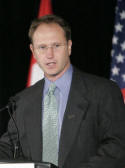 Cameron
Davis, Senior Advisor to the Administrator (Great Lakes), U.S.
Environmental Protection Agency, Great Lakes National Program Office Cameron
Davis, Senior Advisor to the Administrator (Great Lakes), U.S.
Environmental Protection Agency, Great Lakes National Program Office
 Cameron
Davis is Senior Advisor to the U.S. Environmental Protection Agency
Administrator. In that capacity he provides counsel to Administrator
Lisa Jackson on the Obama Administration’s Great Lakes Restoration
Initiative. His job includes coordinating Great Lakes policy and funding
initiatives with more than one dozen federal agencies and with state,
municipal, tribal, business and civic partners. The focus of this
work involves restoring habitat, reducing pollution, preventing the
introduction of invasive species, reducing runoff and enhancing coastal
health for people, fish and wildlife. Cameron
Davis is Senior Advisor to the U.S. Environmental Protection Agency
Administrator. In that capacity he provides counsel to Administrator
Lisa Jackson on the Obama Administration’s Great Lakes Restoration
Initiative. His job includes coordinating Great Lakes policy and funding
initiatives with more than one dozen federal agencies and with state,
municipal, tribal, business and civic partners. The focus of this
work involves restoring habitat, reducing pollution, preventing the
introduction of invasive species, reducing runoff and enhancing coastal
health for people, fish and wildlife.
For more than two decades, Mr. Davis has worked to
develop and implement water quality and quantity policy. Starting as a
volunteer, he served as a litigating attorney and law teacher at the
University of Michigan Law School before serving as president and CEO of
the Alliance for the Great Lakes. Under his leadership, the organization
won the American Bar Association’s Distinguished Award in Environmental
Law & Policy, the first time for a public interest organization in the
honor’s history. He earned his law degree, including certification in
environmental and energy law, from the Chicago-Kent College of Law and a
B.A. from Boston University in International Relations.
While working in Chicago, Washington, D.C. and
throughout the eight Great Lakes states, Cam lives across the street
from Lake Michigan with his wife Katelyn, a child psychologist, and
young son, where they try to swim in the lake several times a week, but
only when it’s warm enough.
John Lawrence, Senior Science
Advisor to the Region Director-General for Ontario,
Environment Canada
Dr. John Lawrence obtained his B.Sc. and Ph.D. degrees in
chemistry from the University of Bristol in the U.K. He
joined the Canadian public service in 1973 as a Research
Scientist with Environment Canada’s National Water Research
Institute, NWRI which is now part of the Water Science &
Technology Directorate, WSTD.
Over his career, Dr. Lawrence’s research interests have
covered chemistry of contaminants and nutrients in aquatic
ecosystems; water and wastewater treatment; analytical
methods development; and analytical quality assurance.
Since 1980 Dr. Lawrence has held various research management
positions at Environment Canada, most recently as Director
of the Watershed Hydrology & Ecology Division. He is
currently serving as the Senior Science Advisor to the
Region Director-General for Ontario.
Dr. Lawrence has been very active within the Great Lakes
community. He is Canadian co-chair of the IJC’s Council of
Great Lakes Research Managers, a member of the Canada
Ontario Agreement Implementation Committee and Canadian
co-lead of the Cooperative Science & Monitoring Initiative
steering committee. In addition he is a member of the GLWQA
Great Lakes Executive Committee and Canadian co-lead for
Annex 10, Science.
KEYNOTE SPEAKER:
Thursday, August 1, 3:30pm –
4:10pm
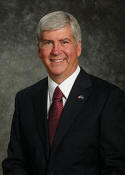 Rick
Snyder, Governor of Michigan Rick
Snyder, Governor of Michigan
 Three
years ago, businessman Rick Snyder was a virtual unknown in the
political world. When he first decided to run for governor, his standing
in the polls was so low that taking the margin of error into account, he
theoretically could have had negative numbers. Political pundits said
there was no way he could compete against the better known field of
experienced political rivals. Three
years ago, businessman Rick Snyder was a virtual unknown in the
political world. When he first decided to run for governor, his standing
in the polls was so low that taking the margin of error into account, he
theoretically could have had negative numbers. Political pundits said
there was no way he could compete against the better known field of
experienced political rivals.
The pundits were wrong.
Governor Rick Snyder won in a landslide victory after running as "One
Tough Nerd" ready to make the tough decisions career politicians refused
to make. The tactic led one particularly snarky pundit to quip "I guess
nerd tested better in the focus groups than dork."
As a candidate, Gov. Snyder pledged to eliminate the job-killing
Michigan Business Tax and replace it with a flat, 6-percent corporate
income tax that is simple, fair and efficient. He pledged to
structurally balance the budget without using accounting gimmicks or
quick fixes. He pledged to create an environment where small businesses
can grow and create jobs.
The businessman-turned-politician has delivered. As promised, he
eliminated the job-killing Michigan Business Tax. He ended the unfair
double tax on small business owners. Working together with lawmakers,
the governor eliminated the state's $1.5 billion deficit. And in stark
contrast to the partisan fighting that led to two government shutdowns
under his predecessor, Gov. Snyder got the budget done by the earliest
date it has been completed in 30 years.
When Gov. Snyder came into office, Michigan barely had enough money
saved in the rainy day fund to run the state for approximately 30
minutes. Under Gov. Snyder, the state is doing the responsible thing by
saving for the future and paying down its long term debt.
Gov. Snyder earned his undergraduate degree, MBA and law degree from the
University of Michigan - all by the age of 23. After teaching at the
University of Michigan, he went to work as a tax accountant at Coopers &
Lybrand - now PriceWaterhouseCoopers - where he made partner after only
six years. He then joined the fledgling computer company Gateway and
helped it grow from a little over 700 employees to a Fortune 500 company
with more than 10,000 employees before leaving to form his own
successful venture capital firm.
Serving as an elected official brings challenges that are different than
working as a CEO in the private sector. Now that he is the making tough
decisions needed to Reinvent Michigan, Gov. Snyder is encountering
resistance from entrenched special interests, protestors and recall
efforts.
But anyone who has had an opportunity to hear the governor speak knows
that he is not interested in being negative or getting bogged down by
unproductive partisan fighting. It's this same spirit of "relentless
positive action" that has him working on an accelerated schedule of "dog
years" as governor.
As the governor said during his inauguration, we can only achieve
extraordinary things if we aspire beyond traditional thinking. Do not
shy away from high expectations - deliver on high expectations.
CLOSING PLENARY
SESSION:
Friday, August 2, 10:45am-12pm
David Doig, President, Chicago Neighborhood
Initiatives — "The Closing of Meigs Field"
David Doig is a seasoned professional in community
development, real estate, finance, and government. With over 20 years
of experience, Doig is President of Chicago Neighborhood Initiatives (CNI).
CNI is a not-for-profit community development corporation focused on
mixed-use real estate developments on Chicago's Far South Side and is a
Community Development Entity investing New Market Tax Credits in high
impact neighborhood projects.
Doig leads CNI and its partner US Bank in the
development of Pullman Park, a 200-acre mixed-use redevelopment of a
former Ryerson Steel site. Currently under construction, the first phase
of Pullman Park is a $30 million, 50 acre, Wal-Mart anchored retail
center. Overall the project will bring over 1000 new jobs, much-needed
retail, affordable housing, and recreation to Chicago's Pullman
neighborhood. In addition, CNI has successfully completed investing $50
million of New Market Tax Credits into a community center, a
neighborhood hospital, a new Charter School, and a community health
center, creating several hundred new jobs – all within less than a year.
Prior to leading CNI, Doig worked in a variety of
capacities within Mayor Daley’s administration, most recently as General
Superintendent and CEO of the Chicago Park District. As Park District
Superintendent, Doig oversaw a $350 million operating budget and a staff
of over 3000. Under his leadership the Park District’s bond rating
improved and the District issued its first revenue bonds. He led major
improvements to park facilities, most notably the $650 million
renovation of Soldier Field, the $300 million shoreline revetment
project, and a host of neighborhood park improvements. These included a
new golf course at Douglas Park, a new bowling alley and roller rink in
Englewood, and tens of millions of dollars in fieldhouse renovations
over his four and half year tenure at the parks. Doig worked hard to
increase green space in the parks and launched a variety of innovative
beautification initiatives. Under his leadership, the Park District won
the prestigious America in Bloom award, and in 2002 the U.S. Conference
of Mayors honored the city and park district with its City Livability
Award for Chihuly in a Park: A Garden of Glass at the Garfield
Park Conservatory.
Before being tapped by Mayor Daley in 1999 for the
parks job, Doig was First Deputy Commissioner in the City of Chicago
Department of Planning and Development. Between 1997 and 1999, Doig
managed its neighborhood division which operates city programs to spur
economic development and job growth in neighborhoods throughout the
city. Under his leadership the city created over sixty Tax Increment
Financing districts and acquired hundreds of acres for neighborhood
revitalization.
David Doig joined Chicago government in 1994 as
Deputy Commissioner of Real Estate Services for the Housing Department,
where he oversaw initiatives to redevelop abandoned properties and
expand home ownership and rental opportunities for low-income and
moderate-income families. Before that he spent five years as
development director for the Lawndale Christian Development Corporation,
a community-based organization on Chicago’s West Side. In 1993 and 1994
he was a Leadership Greater Chicago fellow.
In over twenty years of living and working in the
city of Chicago, David Doig has become an expert on how cities and
neighborhoods work. From real estate development to government finance,
Doig has provided leadership and expertise at all levels. When
announcing Doig’s appointment as Park District Superintendent, Mayor
Daley said, “David cares about neighborhoods and understands what it
takes to make them thrive. He has spent time in every neighborhood in
the city, talking with residents, listening to their concerns and
developing programs to improve their quality of life.”
Doig graduated from Wheaton College and received a
master’s degree in social science, with an emphasis on urban policy,
from the University of Chicago. He and his wife Tami live in the
Chicago West Side Austin neighborhood with their two children, Olivia,
19 and Clarke, 16.
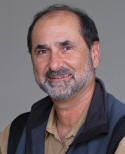 David
Donnenfield, Producer/Director/Writer, Full Frame
Productions — “A Hero’s Calling” David
Donnenfield, Producer/Director/Writer, Full Frame
Productions — “A Hero’s Calling”
David Donnenfield is a writer, producer, and
instructional designer for digital media at Full Frame Productions, a
video production company in San Francisco. He is also Director of
Acquisitions for The Video Project, a distributor of environmental
documentaries to the educational and institutional market.
David has worked with numerous environmental
organizations and agencies over the years such as CALFED Bay Delta
Program, U.S. Army Corps of Engineers, CA Audubon, CA Native Grass
Association, and CA Academy of Sciences in crafting memorable messaging
for public outreach. He is skilled in presenting complex concepts in
ways that are coherent and interesting to lay audiences. Besides his
creative contributions, David provides guidance in matters of
dissemination so that video programming is broadly seen, whether via the
web, TV broadcast, DVD or other viewing technologies. Otherwise, what’s
the point?
Along with his partner, Kevin White, David has been
developing stories on environmental restoration for their broadcast
series, “How On Earth.” Many of these stories deal with habitat
restoration and species recovery. One such program, “A Simple Question,”
showcases a nationally-recognized student-initiated project to restore
the riparian habitat of the endangered CA freshwater shrimp. Working
with private landowners, biologists, agency personnel, and other
partners, students have led the way in restoring over 23 miles of
streamside habitat and bringing back the shrimp. The video program has
garnered over a dozen film festival awards worldwide, been nominated for
an Emmy, and is credited with helping to save the project itself in this
era of funding shortfalls.
Donnenfield holds a B.A. in film from UCLA and a
Masters in Educational Technology/Instructional Design from San
Francisco State University. His films have won the CINE Golden Eagle,
the Silver Telly, film festival awards, and have been broadcast on PBS.
In 2010, he received the Harold Gilliam Excellence in Environmental
Journalism Award from The Bay Institute.
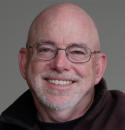 Kevin
White, Producer/Director/Writer, Full Frame Productions
— “A Hero’s Calling” Kevin
White, Producer/Director/Writer, Full Frame Productions
— “A Hero’s Calling”
Kevin is an award-winning producer, director and writer who has worked
in media since 1982. After graduate school at Stanford and San Francisco
State University, Kevin free-lanced for ITV, CBS News, Nightly Business
Reports, and several syndicated shows in various production capacities.
He founded Full Frame Productions in 1984, and the nonprofit, Filmmakers
Collaborative SF, in 1988 with filmmaking colleague Michal Aviad.
Kevin has produced dozens of independent and sponsored films for
broadcast, corporate communications, advertising, and other distribution
venues. His work has been broadcast internationally on PBS, CBS, ABC,
Discovery, National Geographic, Bravo, BBC, ZDF, and featured at dozens
of film festivals, including the Berlin Film Festival, Hot Springs
Documentary Film Festival, US Film Festival (Sundance), The San
Francisco International Film Festival (Golden Gate Award Recipient) and
many others.
In 2010, Kevin and his colleague, David Donnenfield, were the recipients
of the Harold Gilliam Excellence in Environmental Reporting Award for
their work on the “How On Earth” project.
|